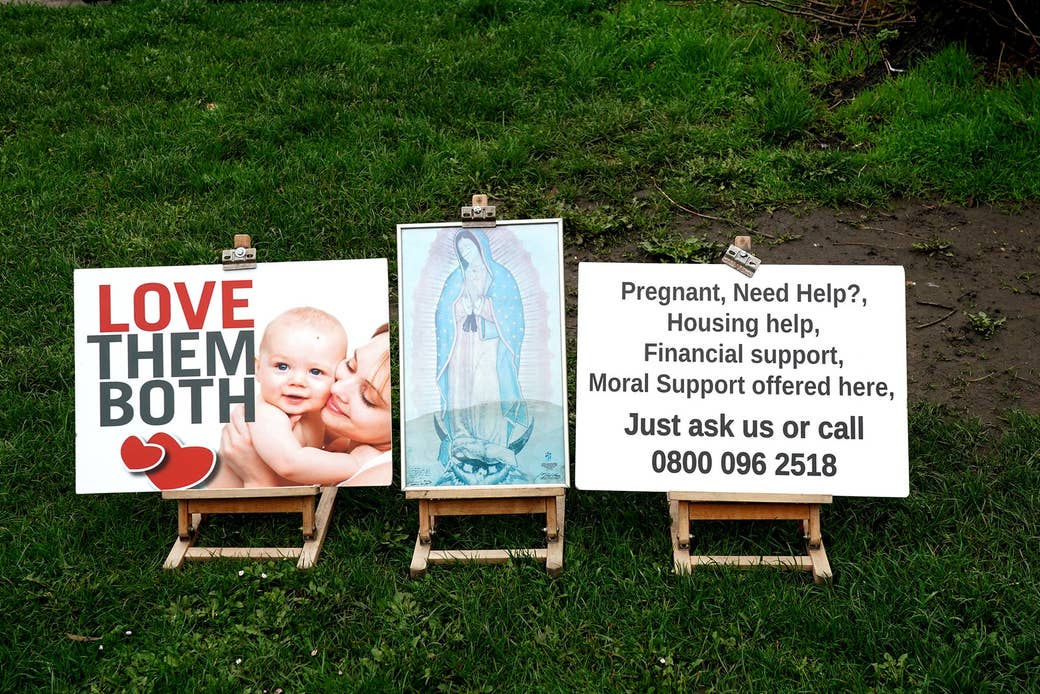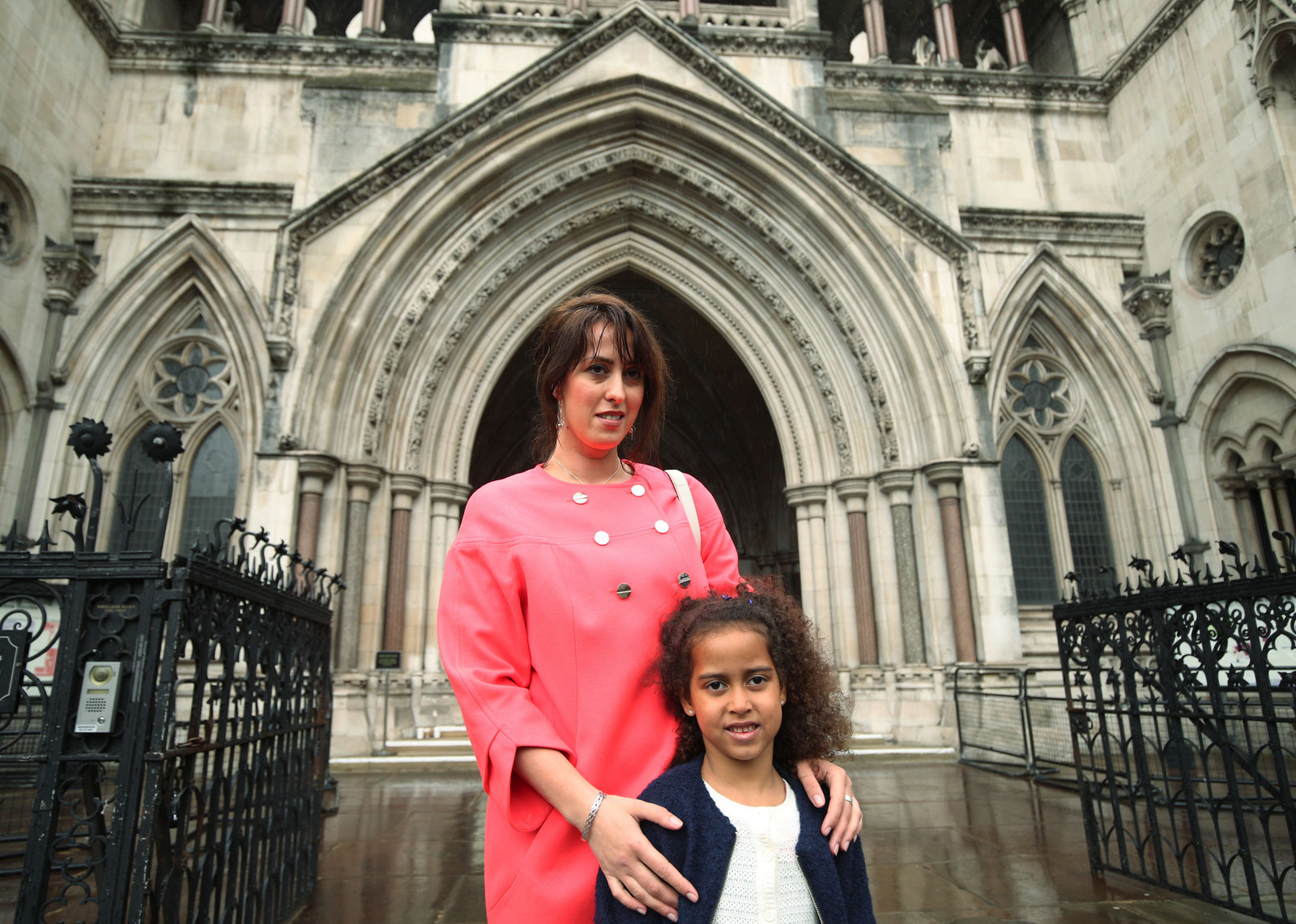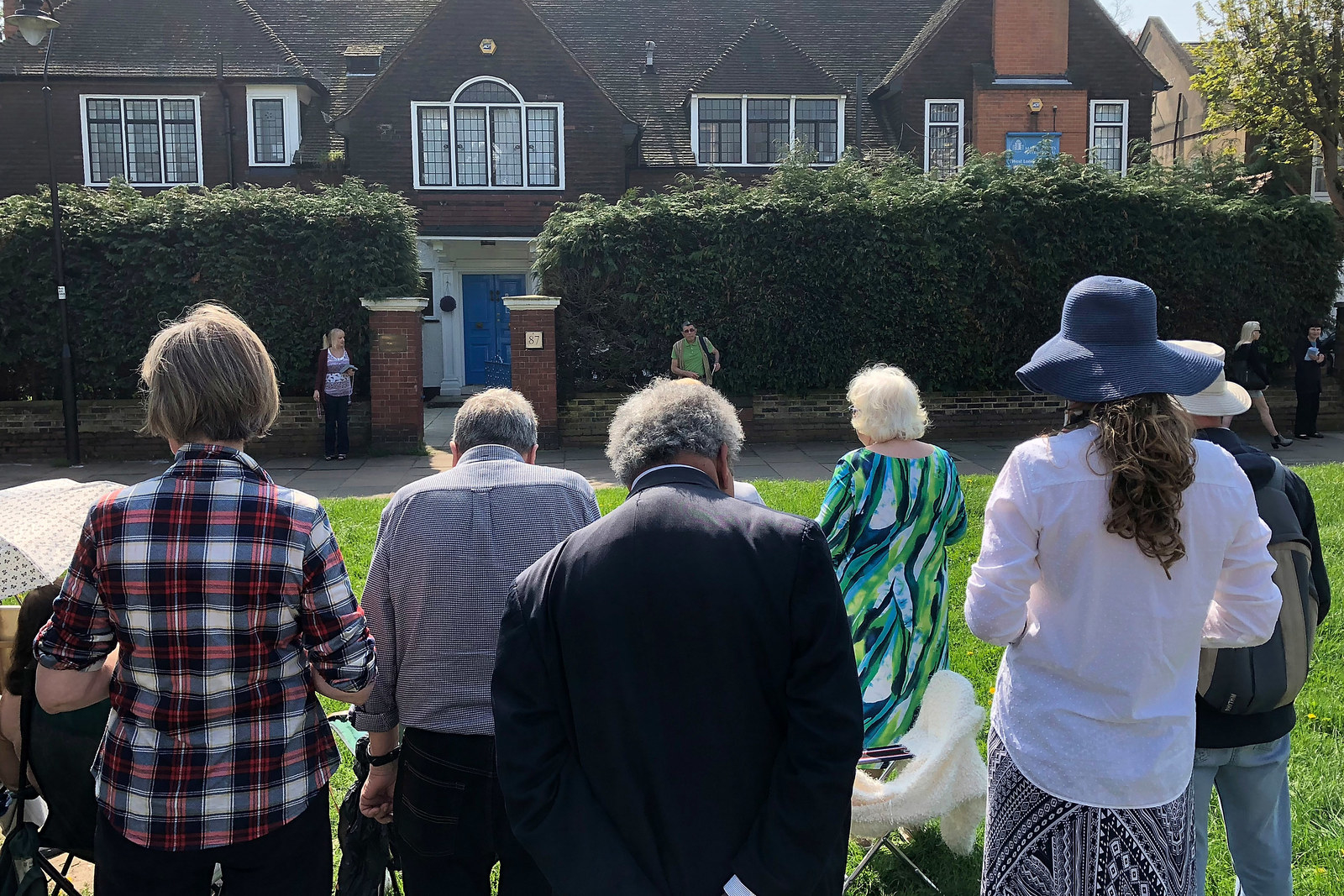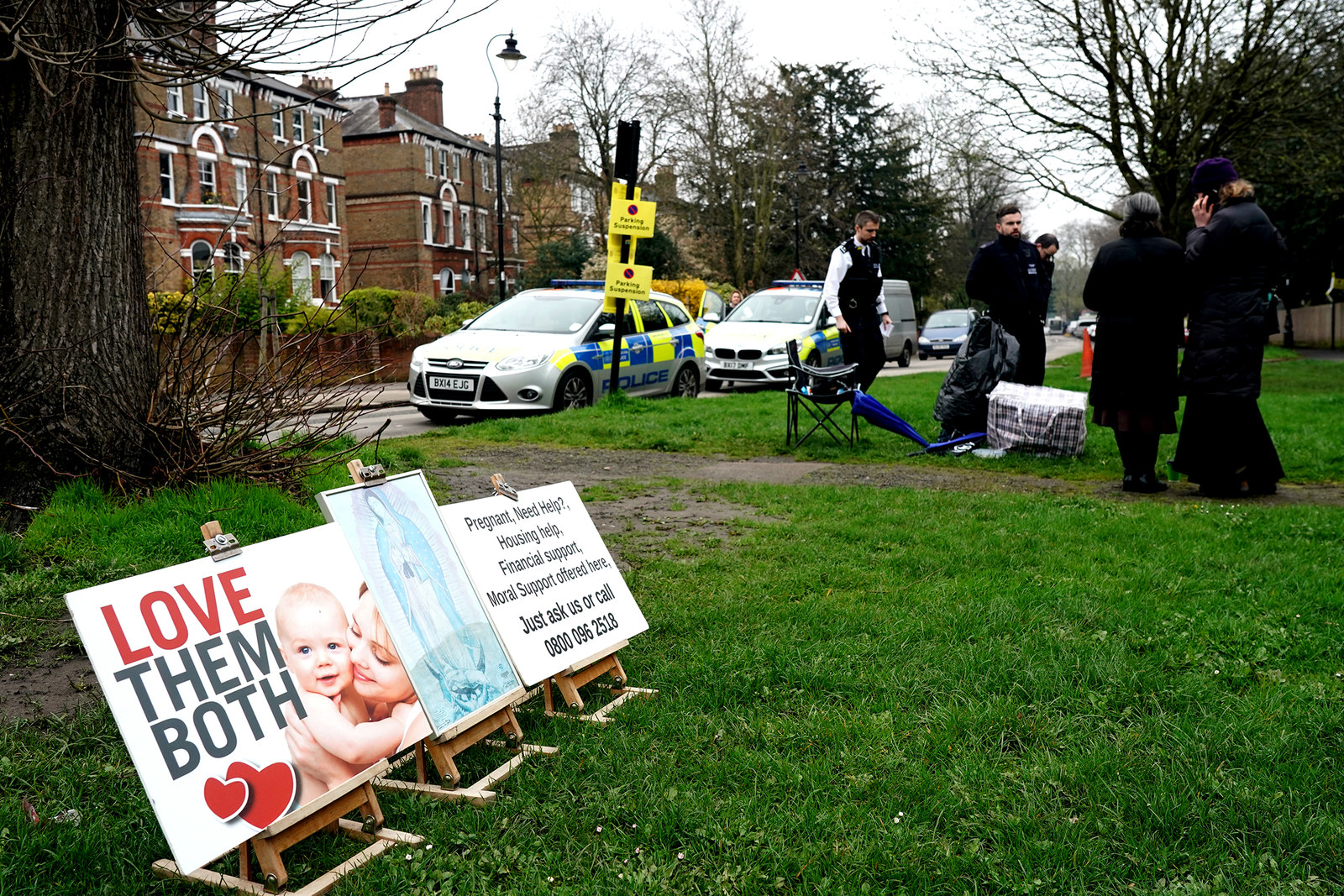Incidents of alleged harassment have virtually disappeared at a London abortion clinic that recently became the first in the UK to impose a “buffer zone” preventing protesters from congregating outside it.
Until April this year, when the council in Ealing, west London, unanimously agreed to introduce a public spaces protection order (PSPO) preventing any form of protest within 100 metres of the Marie Stopes clinic in the area, it had long been a target of anti-abortion protesters who attempted to discourage women from going ahead with the procedure.
“[Women] no longer have to run a gauntlet, so they’re accessing our services and we don’t have anyone that’s distressed for that reason as they come through the door,” clinic manager Sally O’Brien told BuzzFeed News.
“Previously you would expect clients to come in and be tearful, very distressed, and sometimes very angry about how they had been treated on the way into the clinic,” Ciara McHugh, clinical team leader at Marie Stopes Ealing, told us. “They’d want to know why we hadn’t done anything about it.”
Without the persistent presence of protesters clutching rosary beads, plastic foetuses, and leaflets urging women not to get abortions at the gate of the clinic, the large converted house where the clinic is situated was barely distinguishable from the other neat suburban semis on leafy Mattock Lane when BuzzFeed News visited.
“They were there every single day from 8am until 4pm,” O’Brien said. “A lot of people can’t find the clinic now. The protesters helped people see where it was!”
Anti-abortion groups across the UK hold “prayer vigils” and claim to offer support and counselling to women as they enter abortion clinics.
“As long as there are women having to resort to abortions they do not want, there will be charitable groups trying to assist them,” a spokesperson for Be Here for Me, one of the anti-abortion groups that have held protests at the Ealing clinic, told us. “It’s a grievous injustice that the law is now hindering the offer of vital assistance to women who have nothing and no one to help them.”

But patients and staff have said that the presence of anti-abortion protesters at clinics often amounts to intimidation and harassment.
“On my first visit early in the morning there was a woman clutching a cross standing right by the entrance and shouting things at me, and on my second visit on leaving I was chased by a man with leaflets and shouting,” a patient visiting the Ealing clinic last year wrote in evidence submitted to the local council.
“It was an added stress to an already stressful situation,” wrote another. “I found it very upsetting — the protestors have no idea under what circumstances you are there and have no right to pass judgement or comment on what is going on.”
Clinic staff in Ealing have noticed a huge difference in their patients since the PSPO was introduced.
“It was a daily, almost hourly occurrence that someone would come in and be upset,” O’Brien said.
“There’s nothing there whatsoever now. People just come in and have their appointment.”
In 2017, the clinic recorded an average of seven incidents of harassment per month, in a book kept by staff, although O’Brien said there were usually more, but many women chose not to officially document their experience with protesters prior to their appointments. In January this year there were seven recorded incidents of harassment, followed by 15 in February, three in March, and one in April before the PSPO was imposed towards the end of the month.
In May and June, with the PSPO in effect, there were no reported incidents of women using the clinic being harassed or intimidated.
“We don’t need the book any more!” O’Brien said. “It’s still there, but it’s not being used. It’s so nice that it’s not even a factor any more.”
On the morning BuzzFeed News visited, a couple of women calmly sat waiting for their appointments while reception staff quietly shared friendly updates with one another about their weekends. Only a sign above the check-in desk, which read “our staff will not tolerate abuse of any kind”, hinted at any chance of animosity.

McHugh has also noticed a huge difference in her patients since the introduction of the PSPO.
“What we’re noticing now is that it’s just not an issue any more,” she said. “We’re not finding women coming in distressed.”
Anti-abortion groups who congregate outside clinics say that they aim to provide alternatives to women who may feel uncertain about whether they should go ahead with an abortion.
Staff we met at the Ealing clinic said that women have usually made up their minds by the time they see them, and that counselling is provided to women, before and after the procedure, to ensure they are comfortable with their decision. Around 20% of women who make an initial appointment don’t go ahead with the procedure at both Marie Stopes and the British Pregnancy Advisory Service (BPAS), which together provide the majority of abortions in the UK.
Rather than offer support to women seeking abortion, clinic staff say, the presence of anti-abortion groups outside clinics gets in the way of women accessing medical care anonymously and without judgment. “You can go to the dentist and no one’s going to stop you going in,” O’Brien said.
McHugh said that as a midwife, it was not her role to convince women whether or not to have an abortion.
“We’re healthcare providers and you don’t ever think when you become a nurse, midwife, or doctor that you’re going to have to shield your clients from cruelty,” she said.
“It’s never going to be a pleasant day, because it’s never pleasant when you need to access some kind of medical procedure, but in terms of people’s decisions, they’ve already been made by the time they get to us,” she continued.
“If they need to access counselling, we offer that, or any support that’s required,” McHugh continued. “It doesn’t help to have someone call you a murderer or say, ‘Please, Mummy, don’t kill me.’ We can’t possibly assess the long-term psychological effect this is having on women.”
But while the PSPO at the Ealing Marie Stopes clinic means that women in seeking abortion there will no longer encounter anti-abortion groups, staff and patients at clinics across the country continue to report harassment, including being followed and verbally abused by protesters. In 2017, an anti-abortion group broadcast their demonstration outside BPAS's Hastings clinic to Facebook live, which many worried would compromise the anonymity of women using the clinic.
A BPAS spokesperson told us that the service’s clinics in Richmond, Bournemouth, Manchester, and Birmingham also regularly have anti-abortion protesters at their doors, while Marie Stopes clinics in Manchester and Birmingham remain targets.
“They were praying with crosses and rosary beads. I started to cry immediately — they made me feel like I was doing something wrong,” a woman seeking treatment at BPAS’s Bournemouth clinic last month told staff.
Family members accompanying women to their appointments have also been made to feel uncomfortable. “They were standing right by the main entrance, praying for all the babies that were going to be killed,” a relative of a woman accessing BPAS services in Bournemouth recently said. “It feels as if they are trying to intimidate or guilt-trip women who are in a vulnerable state and don’t need that.”
Anna Veglio-White, cofounder of Sister Supporter, the campaign group that led efforts to lobby Ealing council to introduce a PSPO, told BuzzFeed News that it is pushing for similar measures at abortion clinics elsewhere.
“Women and pregnant people may or may not be tormented depending on the location of the clinic they are sent to,” she said.

“Over 40 clinics in the UK suffer from street harassment and it's time we had a national solution.”
Earlier this year, under then-home secretary Amber Rudd, the Home Office asked abortion clinic staff, patients, and members of the public to submit evidence as part of a review into harassment outside abortion clinics.
“Protestors in Manchester have followed me up the steps to the clinic and have followed me up the road after work telling me I will go to hell,” a member of Marie Stopes staff wrote in the organisation’s submission.
“I have been verbally abused numerous times and one protester hit my sister in the middle of her back,” another member of staff at Marie Stopes in Manchester wrote.
“They have offered money to ladies to keep the pregnancy, stating they will help her and I have known one lady who was asked if they could BUY the baby from her,” they continued.
“They hold up offensive pictures of abortion pictures and unborn babies.”
A member of Marie Stopes staff in Leeds said women had been called “disgusting” as they entered the clinic.
“One man knocked on the door and shouted ‘baby-killing bastards’ at the nurse who answered the door. Another member of staff had their car vandalised,” they added.
In Birmingham, a member of Marie Stopes clinic staff said that protesters had tried to block cars from parking on the premises, and that they displayed signs featuring graphic images of aborted foetuses. “I have been called a murderer for working here,” they added.
Clinic staff say they have called the police when harassment has escalated, but there is usually very little that can be done, because without a PSPO in place, anybody who wishes can legally protest in the public space outside a clinic.
Oscott College is proud once again to have supported the 40 days life campaign outside of Marie Stopes abortion clinic in Birmingham which finishes tomorrow. Thanks for the hard work of the organisers. We look forward to next time! #40daysforlife
“They have a right to air their views, but we have the right to do our job peacefully and the clients have the right to attend the clinics to access care without intimidation and without making a very sensitive, difficult journey made harder,” said Nikki Lorimer, Marie Stopes regional clinical operations manager, who has witnessed harassment by anti-abortion protesters at clinics in Leeds, Birmingham, and Manchester.
Representatives of anti-abortion groups who regularly congregate at clinics, including Be Here for Me and the Good Counsel Network, deny the behaviour described by staff at Marie Stopes and BPAS.
Nonetheless, in the wake of Ealing’s decision to implement a PSPO at its abortion clinic, a handful of other councils, including Manchester, Birmingham, and the London boroughs of Southwark and Lambeth, have also begun to explore similar measures, but none have yet been carried out. An initial legal challenge to Ealing’s PSPO by Alina Dulgheriu, who claims to have been helped by clinic protesters when she sought an abortion, was rejected by the High Court in July. She has since raised more than £30,000 to take the case to the Court of Appeal.
In May, a cross-party group of more than 150 MPs, led by Labour MP for Ealing Rupa Huq, signed a letter to newly appointed home secretary Sajid Javid, asking him to commit to exploring plans for national legislation to eradicate harassment outside abortion clinics as the review commissioned by Rudd had begun to do.
So far, no further action has been taken since the review closed in February, and the Home Office has not yet published its findings.
Pleased @ukhomeoffice Review into immigration detention released but we were meant to also have one on buffer zones by now. Spoke to @sajidjavid after who promised after he'd act, As @SisterSupporter @bpas1968 campaigns state women should access legal healthcare intimidation-free https://t.co/44LHlyP08F
In July, Javid wrote to Huq promising a response to the review before parliament disbanded for summer recess, but when the House of Commons recently rose for the final time this session, no further detail of how the Home Office intends to tackle harassment outside abortion clinics had emerged.
“I know Home Secretary Sajid Javid has a full in-tray with cyber bullying and terrorism to boot, but with parliament now broken up for summer recess he’s failed to honour his promise to me to publish the results of the Home Office review into this intimidation nationally,” Huq wrote in an update to constituents published in Ealing Gazette last week.
“Parliamentarians of all parties, including Father of the House Kenneth Clarke co-signed a letter to asking for action, but from Javid, not a dicky-bird,” she continued.
“This is a national problem that requires a national solution but just the Home Office don’t seem to be able to deliver.”
A Home Office spokesperson said this was a “sensitive and complex issue” and that it was important to ensure they made the right decisions in tackling it.
“We have conducted an in-depth assessment of protests outside abortion clinics – including looking at the impact of the Public Space Protection Order in Ealing – and will publish our findings in due course,” the spokesperson added.
McHugh told us she believed the success of the PSPO in Ealing made a strong case for such measures to be rolled out nationally.
“At the moment it’s a postcode lottery,” she said. “You can go to somewhere in Birmingham and be exposed to that level of harassment, whereas here you don’t, and that’s not equality.”

CORRECTION
Ciara McHugh is a midwife and clinical team leader at Marie Stopes. A previous version of this article misstated her name and job title.
